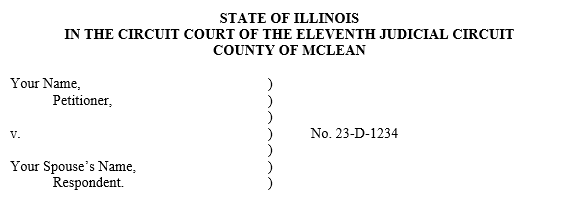Family court proceedings can be emotionally charged and complex, often involving disputes over issues like child custody, visitation rights, spousal support, and more. When you find yourself in such a situation, it’s crucial to provide the court with accurate and persuasive information to support your case. One way to do this is by submitting a well-crafted affidavit. In this article, we will guide you through how to write an affidavit for family court in Illinois.

What Is an Affidavit?
An affidavit is a written statement made under oath, typically in the presence of a notary or other authorized officer. In family court, affidavits are used to present facts, evidence, and your perspective on the issues at hand. They provide a way for the court to consider your side of the story and can be instrumental in influencing the outcome of your case. To learn more about introducing evidence in court, check out “How To Present Evidence In Family Court in Illinois.”
Why Use An Affidavit?
There are also different reasons one might want to use an affidavit which may change parts of it. Because affidavits are used to present facts, an affidavit can cover many different issues and include a lot of information. Here are several different types of affidavits used in family court:
- Financial Affidavits: These are used to disclose financial information and confirm the validity of that information. Divorce courts require full disclosure of all financial information.
- Child Custody Affidavits: If you have a dispute regarding child custody, then you may draft a child custody affidavit to show evidence that you are a good parent, or that the other parent is a bad parent.
- Affidavit of Eyewitness: If there are allegations of abuse, neglect, drug use, adultery, or some other issue, an affidavit made by an eyewitness can confirm these allegations. These affidavits should include facts and observations, and not feelings or beliefs.
It is important to be as detailed as possible in an affidavit. The more detailed the document is, the more persuasive it can be. Include dates, times, locations, and any other evidence you have that can bolster your truth. Remember, however, that both sides will have a chance to cross examine all evidence presented, and presenting false or inaccurate information will hurt your case.
To learn more about false allegations, check out “15 Ways to Disprove False Allegations in Family Court.”

Key Components of an Affidavit for Family Court
It is possible to find forms online that will help you draft an affidavit, or you can also rely on your attorney to draft one for you. You can often find forms and templates on your local county courthouse’s website that may help. There are, however, several requirements that must be met for an affidavit to be valid. Generally, this is the format for an affidavit:
1. Heading and Caption
Your affidavit should begin with a clear heading that includes the court’s name, your name, and your case number. This information helps in identifying your affidavit in the court’s records. Typically all documents filed in the case will have the same heading similar to that seen below (yours should be single spaced):

AFFIDAVIT OF JACK DOE
2. Introduction
Start your affidavit with a brief introduction. State your relationship to the case (plaintiff or respondent) and your reason for filing the affidavit. Be concise and to the point. An easy way to start this paragraph is:
“I, (person’s name), being of majority years and having personal knowledge of the facts and issues of this cause of action, state and depose under oath as follows:”
You can be more specific about the facts or issues in your introduction, but you should leave most of the specifics for your numbered paragraphs below the introduction.
3. Personal Information
Provide your personal details, including your full name, address, phone number, and occupation. This information establishes your identity and credibility. This may not be necessary, however, if you have already filed several motions and the court already has this information. You should include personal information if you are creating an affidavit for a witness that isn’t you or your spouse, such as any extended family members, friends, experts, or acquaintances.
This paragraph should be your first numbered paragraph. All the paragraphs between the introduction and the conclusion should be numbered. Try to keep each fact to its own numbered paragraph.
4. Sworn Statement
The heart of your affidavit is the sworn statement. This is where you present the facts, details, and evidence relevant to your case. Use clear and concise language and organize your points logically. Consider the following tips:
- Be Factual: Stick to the facts. You should avoid making unsupported claims or allegations based on feelings. Use concrete examples with proof to support your statements. It is best to say, “I witnessed” or “I saw” rather than using “I think” or “I believe”. Unless your witness is an expert (like a doctor or psychologist), then the witness should stick to facts that they personally observed. Only experts are allowed to give opinions, and they can only give opinions on matters they are an expert in.
- Chronological Order: If your affidavit involves a series of events, present them in chronological order. This makes it easier for the court to follow your narrative.
- Quotes and Conversations: If possible, include verbatim quotes and details of relevant conversations. If you are worried about this, it may help to keep a record of your conversations in a journal with dates and times. Text messages are also admissible if they can be verified.
- Documents and Evidence: If you have documents, records, or other evidence that support your claims, reference them in the affidavit and consider attaching them as exhibits.
- Language and Tone: Maintain a respectful and professional tone throughout the affidavit. Courts always take into account the attitude of those involved, and acting unprofessional can hurt your credibility.

5. Conclusion Paragraph
In your conclusion, summarize the key points of your affidavit and reiterate your request or desired outcome. Be clear and specific about what you are seeking from the court. This typically means asking the court to find for your position, and against your spouse’s position, followed by the quick summary of your reasons listed above.
6. Notarization
An affidavit must be signed in the presence of a notary public or an authorized officer who can administer oaths. They will also sign and seal the affidavit, affirming that you made the statement under oath. This step is what makes a properly drafted affidavit admissible in court.
Tips for a Strong Affidavit
- Use clear and concise language.
- Avoid emotional language or personal attacks.
- Review and proofread your affidavit for grammar and spelling errors.
- Keep a copy of your affidavit for your records.
- Consult with an attorney for guidance and to ensure your affidavit is legally sound.
Conclusion: How to Write an Affidavit for Family Court in Illinois
Writing an affidavit for family court is a crucial step in presenting your case effectively. By following the guidelines outlined in this blog post, you can create a well-structured, compelling, and legally sound affidavit. Remember to consult with a family law attorney, like those at KGN Law Firm, for advice tailored to your specific situation and to ensure that your affidavit adheres to your jurisdiction’s legal requirements. A well-prepared affidavit can significantly impact the outcome of your family court case, so take the time to craft it carefully and thoughtfully.
MEET WITH AN ILLINOIS FAMILY LAW ATTORNEY TODAY
The Family Law attorneys at Koth Gregory & Nieminski understand that your family is the top priority, which is why we offer SAME-DAY APPOINTMENTS. If you need a divorce or other family law services, you can schedule your first meeting through our online appointment calendar. We look forward to meeting you.
Disclaimer: This article (How to Write an Affidavit for Family Court in Illinois) may contain information that is outdated as Illinois law continuously evolves. Meeting with an experienced family law attorney is the best way to ensure you are receiving the most current information about How to Write an Affidavit for Family Court in Illinois.

Published by Dustin Koth on October 30, 2024
